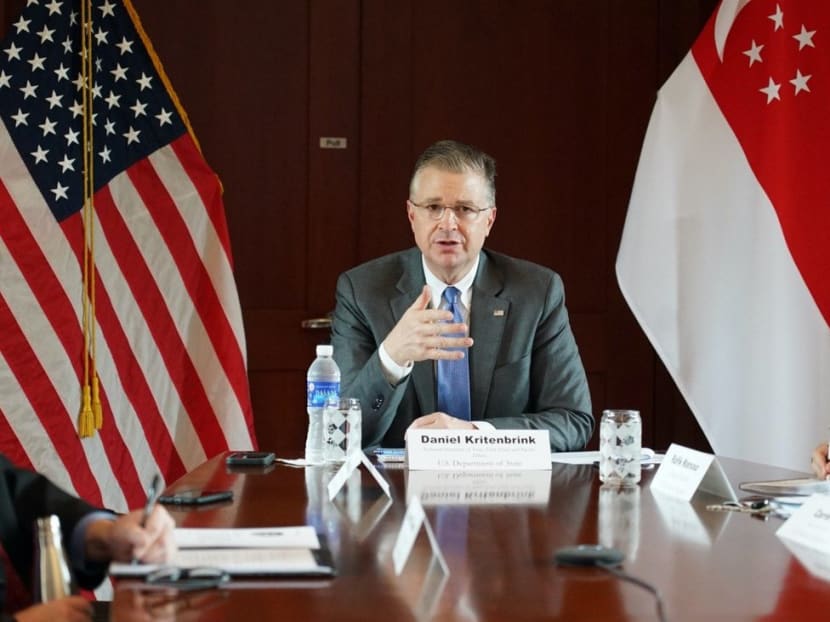Singapore’s non-invite to Biden’s democracy summit ‘not a judgement’: US diplomat
SINGAPORE — The upcoming democracy summit that US President Joe Biden will host is not intended for participants to "sit in judgement" of nations that are not invited, and the omission of the likes of Singapore from the forum is not an indictment of bilateral ties with Washington, a senior US diplomat has said.

Mr Daniel Kritenbrink (pictured), the United States' Assistant Secretary of State for East Asian and Pacific affairs, was in Singapore as part of a Southeast Asia tour.
SINGAPORE — The upcoming democracy summit that United States President Joe Biden will host is not intended for participants to "sit in judgement" of nations that are not invited, and the omission of the likes of Singapore from the forum is not an indictment of bilateral ties with Washington, a senior US diplomat has said.
Speaking to regional journalists in Singapore, Mr Daniel Kritenbrink, the US Assistant Secretary of State for East Asian and Pacific affairs, said the summit was instead an opportunity for a "select number" of the world's democracies to exchange views on how such societies could better deliver benefits to citizens and promote democracy.
"This is not designed to be a forum in which we sit in judgement of other countries," Mr Kritenbrink said, responding to a question on why Singapore, Thailand and Vietnam were among the regional countries omitted from the Dec 9-10 event.
The event — to be held virtually — has been touted as the first of its kind, and will feature governments from more than 100 countries. The summit has attracted controversy in recent weeks after the Biden administration invited representatives from self-ruled Taiwan, drawing a sharp reaction from Beijing.
"Given that only a number of countries were invited, there are a range of countries including some of our closest partners like Singapore, who were not invited. But that is not a commentary on the strength of our partnership with Singapore," Mr Kritenbrink said.
Mr Kritenbrink, a career diplomat who was Washington's envoy in Vietnam from 2017 until April this year, was in Singapore as part of a four-nation Southeast Asia tour that includes stops in Malaysia, Indonesia and Thailand.
In the 40-minute round table session, the veteran diplomat also touched on Myanmar's post-coup crisis, saying he had discussed the matter with regional leaders.
Junta leader Min Aung Hlaing has thus far ignored calls from the international community for military forces to cease a bloody crackdown on anti-coup protesters, release political detainees and chart a path back to democracy.
Rights monitors say over 1,300 civilians have been killed since the coup, and parts of the country have been embroiled in civil strife after the anti-junta shadow government, the National Unity Government, declared a "defensive war" against the military.
The West has imposed several rounds of sanctions on junta officials, and Mr Kritenbrink noted that "when it comes to sanctions, I would say all options are on the table". He said the US would continue to evaluate additional steps it could take to "cut off funding streams" of the junta.
Asked about Taiwan, Mr Kritenbrink said the US approach remained the same but what had changed was that recent actions by Beijing were "designed to increase pressure and coercion on Taiwan".
Just last week, mainland China sent 27 warplanes to the island, which Beijing views as a renegade province, its biggest sortie in more than seven weeks.
While Washington had interests in promoting peace and maintaining the status quo across the strait, Mr Kritenbrink said the US would "need to respond… in an appropriate way" as the threat and coercion from China increases.
This, he said, could take the form of assisting Taiwan to maintain a credible self-defence force or to grow bilateral economic and trade ties.
Reiterating points raised by Mr Biden to his Chinese counterpart Xi Jinping last month, the diplomat stressed there were areas where the two world powers had fundamentally opposing views, and that the US would defend its values.
He noted, however, that the US intended to compete responsibly and would cooperate with Beijing in areas such as climate change.
"As we carry out this intense competition, in which we intend to prevail, we want to engage in intense diplomacy as well, so as to prevent the relationship from veering into conflict, which is not in anyone's interest," he said. SOUTH CHINA MORNING POST









